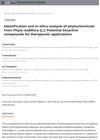2 citations,
July 2022 in “BioMed Research International” Finasteride-loaded nanogels are effective, safe, and improve drug absorption through the skin.
2 citations,
June 2022 in “Cells” 3D cell cultures are better for testing hair growth treatments than 2D cultures.
2 citations,
December 2021 in “Pharmaceutics” Finasteride-loaded proniosomes effectively promote hair growth in mice.
 2 citations,
November 2021 in “International Journal of Applied Pharmaceutics”
2 citations,
November 2021 in “International Journal of Applied Pharmaceutics” The phytosome lotion made from Mangkokan leaf extract was more effective for hair growth than 2% minoxidil, especially at 30% concentration.
2 citations,
April 2021 in “Asian pacific Journal of Tropical Biomedicine” Origanum vulgare leaf extract reduces liver and kidney damage caused by finasteride in mice.
2 citations,
February 2021 in “Case reports in dermatological medicine” The new topical botanical formulation significantly regrew hair in all five patients without side effects.
 2 citations,
January 2019 in “Indian Dermatology Online Journal”
2 citations,
January 2019 in “Indian Dermatology Online Journal” The congress concluded that misuse of antifungal drugs in South Asia has led to widespread treatment failure, and new approaches and regional cooperation are needed.
1 citations,
February 2024 in “Pharmaceutics” Nanovesicles improve drug delivery through the skin, offering better treatment outcomes and fewer side effects.
 1 citations,
January 2024 in “Cellular & Molecular Biology Letters”
1 citations,
January 2024 in “Cellular & Molecular Biology Letters” Adipose-derived stem cells help heal burns but need more research.
 1 citations,
November 2023 in “Journal of ovarian research”
1 citations,
November 2023 in “Journal of ovarian research” Agaricus subrufescens improves ovarian function and biochemical health in rats with PCOS.
1 citations,
November 2023 in “Polymers” Polyurethane dressings show promise for wound healing but need improvements to adapt better to the healing process.
 1 citations,
September 2023 in “Stem cell research & therapy”
1 citations,
September 2023 in “Stem cell research & therapy” Mesenchymal stem cells could help treat aging-related diseases better than current methods.
 1 citations,
September 2023 in “Applied sciences (Basel)”
1 citations,
September 2023 in “Applied sciences (Basel)” Ishige sinicola extract may help prevent muscle atrophy through its antioxidant and anti-inflammatory effects.
 1 citations,
August 2023 in “Military Medical Research”
1 citations,
August 2023 in “Military Medical Research” Smart hydrogel dressings could improve diabetic wound healing by adjusting to wound conditions and controlling drug release.
 1 citations,
August 2023 in “Advanced Drug Delivery Reviews”
1 citations,
August 2023 in “Advanced Drug Delivery Reviews” Microneedles are promising for long-acting drug delivery and can improve patient compliance, but more data is needed to confirm their effectiveness.
 1 citations,
July 2023 in “Frontiers in Immunology”
1 citations,
July 2023 in “Frontiers in Immunology” Oxidative stress and immune dysfunction are linked to both Hashimoto's thyroiditis and polycystic ovary syndrome, with diet and specific treatments important for managing these conditions.
 1 citations,
April 2023 in “International Journal of Molecular Sciences”
1 citations,
April 2023 in “International Journal of Molecular Sciences” Botryococcus terribilis Ethanol Extract may reduce inflammation by changing gene expression in cells.
 1 citations,
March 2023 in “Phytochemistry Reviews”
1 citations,
March 2023 in “Phytochemistry Reviews” CBD may improve skin and hair health, but its effective use and safety need more research.
1 citations,
February 2023 in “Pharmaceutics” New UVA-responsive nanocapsules effectively kill microorganisms in hair follicles when activated by light.
1 citations,
February 2023 in “Ibrain” Black cumin and its nanoformulations show promise in treating neurodegenerative diseases.
 1 citations,
February 2023 in “International Journal of Molecular Sciences”
1 citations,
February 2023 in “International Journal of Molecular Sciences” The fascial layer is a promising new target for wound healing treatments using biomaterials.
1 citations,
January 2023 in “IntechOpen eBooks” Paclitaxel is an effective cancer drug with side effects and potential new uses beyond cancer.
 1 citations,
May 2022 in “Pharmaceutics”
1 citations,
May 2022 in “Pharmaceutics” Tea seed oil in nanostructured carriers stimulates hair growth and feels less greasy when applied.
 1 citations,
October 2021 in “Jundishapur Journal of Natural Pharmaceutical Products”
1 citations,
October 2021 in “Jundishapur Journal of Natural Pharmaceutical Products” Ficus carica leaf extract may help treat melanoma by promoting cancer cell death without harming normal cells.
 1 citations,
February 2021 in “Biodiversitas”
1 citations,
February 2021 in “Biodiversitas” Curcuma aeruginosa rhizome extracts show potential as anticancer agents, with varying effectiveness against breast cancer cells.
 1 citations,
January 2021 in “Journal of Cancer Therapy”
1 citations,
January 2021 in “Journal of Cancer Therapy” Regenerative medicine may help reduce radiotherapy side effects like skin cancer, fibrosis, pain, and hair loss.
 1 citations,
February 2017 in “Journal of pharmacology & clinical research”
1 citations,
February 2017 in “Journal of pharmacology & clinical research” The herbal hair gel with Eclipta alba and Lippia nodiflora extracts was more effective at growing hair than the control gel and minoxidil.
January 2025 in “Pharmaceuticals” Nanocarriers can improve antioxidant delivery to the skin but face safety and production challenges.
 December 2024 in “Plant Science Today”
December 2024 in “Plant Science Today” Phyla nodiflora contains compounds that may help treat diabetes, alopecia, cancer, and anti-diuresis.
 December 2024 in “Advanced Composites and Hybrid Materials”
December 2024 in “Advanced Composites and Hybrid Materials” Electrospun 3D nanofibrous materials show promise for bone regeneration in orthopaedics.


















